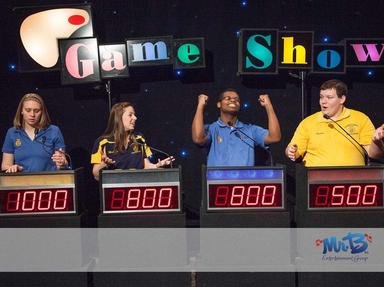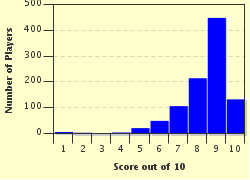Quiz Answer Key and Fun Facts
1. In 1950 a game show debuted on the American CBS network which featured a panel of celebrities questioning a guest in a game similar in format to Twenty Questions. Steve Allen first asked, "Is it bigger than a breadbox?" in 1953, and it quickly became one of the standard questions used by panelists. What was the name of this game show?
2. Garry Moore was the original host of a television show that was first seen on CBS television in 1952, on which he invited contestants, "Whisper your secret to me, and we'll show it to the folks at home". Four celebrity panelists then questioned the contestant, asking yes-no questions in an attempt to determine the reason the contestant was on the show. What was the name of this show, which ran until 1967, and has had several revivals?
3. The Goodson-Todman production company developed yet another celebrity panel guessing show that debuted in 1956 and continued for over 45 years. In what show did the host ask, "Will the real (name of contestant) please stand up?" after the panelists had made their decision as to which of the three contestants was not an impostor?
4. Merv Griffin created a trivia-based game show in 1964 which was hosted by Art Fleming until 1979; the revival in 1984 featured Alex Trebek. What game show brought the phrase "Daily Double" into popular usage?
5. On what game show, originally aired in 1963, and with many versions around the world, might you have heard Monty Hall ask players to choose between "Door #1, Door #2, or Door #3"?
6. Merv Griffin adapted the children's game of Hangman into a game show that brought the world familiarity with the phrase "I'd like to buy a vowel". Syndicated in 60 different countries worldwide, what show ran in the United States in a daytime version from 1975 until 1991, and started its primetime incarnation in 1983?
7. 1976 saw the first airing on American television of a show from the Goodson-Todman production team in which two teams of four or five players strove to guess what others might have given as answers to a certain question. Which show might you have been watching if you heard the host say "Our survey says ..." or "The number one answer is ..."?
8. This game show is British in origin, but it has been franchised around the world since it first appeared in 1998. Depending on where you were watching the show, you might have heard Regis Philbin (US), Eddie McGuire (Australia), Chris Tarrant (United Kingdom) or Tantowi Yahya (Indonesia) asking contestants, "Is that your final answer?" on which of these shows?
9. Another show originating in the United Kingdom saw the original group of nine contestants eliminated one at a time, as the host pronounced "You are _____. Goodbye." The name of what show goes in the blank?
10. In 2003 the BBC started airing a game show in which five established quiz champions faced a team of five challengers. After four one-on-one rounds in which one player from each team was eliminated, the remaining players for the two teams competed in a final round of general knowledge questions. The name of the show was also the term used to refer to the team of established champions. What was it?
Source: Author
looney_tunes
This quiz was reviewed by FunTrivia editor
guitargoddess before going online.
Any errors found in FunTrivia content are routinely corrected through our feedback system.

